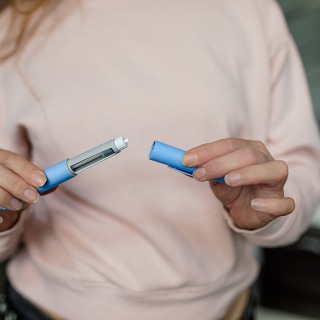Medication titration explained

Dose optimization — or finding the right dose of your medication — is a delicate balance. The goal is to find the minimal effective dose, where you experience the best possible benefits with the least amount of side effects. This process of finding the perfect dose is called titration. Whether you’re beginning a new medication, or your provider is adjusting an existing one, understanding titration can help you be more informed about your medication treatment plan.
What is titration?
Titration is a process where your doctor incrementally increases the dose of your medication over days, weeks, or sometimes months to achieve the optimal therapeutic effect while minimizing side effects. Factors such as weight, whether you have other underlying health conditions, and age can all influence how a patient responds to a certain medication. By titrating medication, your healthcare provider can fine-tune the dosage based on your body’s own personal response to the medication.
For example, Zepbound® (tirzepatide), a medication used for chronic weight management, is titrated to optimize effectiveness, while minimizing adverse side effects like nausea and gastrointestinal upset. A prescriber will often start a patient off with the lowest initial dose (2.5mg) once a week for four weeks. Depending on how the patient responds to the medication, the prescriber may choose to incrementally increase the medication dose (or titrate up) by 2.5mg every four weeks, up to a maximum dose of 15mg a week, until they find what works best for that individual.
The value of titration
There are a few reasons why titration of medication is important.
- It optimizes efficacy. Titration allows your provider to find a dosage of medication that is the most effective for you without overdosing or underdosing. Underdosing medication can lead to insufficient relief from symptoms, while overdosing medication can lead to excessive and unnecessary side effects.
- It reduces side effects. Starting at a lower dose and gradually increasing it over time allows your doctor to closely monitor how you respond to a medication and detect potential issues early on, so they can provide faster intervention and dosage adjustments.
- It improves adherence. A well-tolerated dose makes it more likely that a person will stick with their treatment plan.
Once you are on your optimal dose and expect to be on it for a longer period, you should discuss getting a prescription for a longer day supply, often 90 days, with your prescriber. This ensures you have your medication on hand and reduces the number of refills you need to manage. Depending upon your benefit plan, a longer day supply can be less expensive too.
Commonly titrated medications
Certain medications are more commonly titrated due to their potency, side effects, or the variability in individual response. These include:
- Blood pressure medications: beta-blockers, ACE inhibitors, angiotensin receptor blockers
- Diabetes medications: insulin, metformin, GLP-1s
- ADHD medications
- Blood thinners: warfarin
- Antidepressants and antipsychotics: quetiapine, citalopram
- Seizure medications
- Pain management medications: opioids
- Thyroid medications
- Heart failure medications: digoxin, diuretics
Additionally, some medications, such as statins, ADHD medications, and antidepressants, take time before you notice the full effects. In such cases, titration allows for gradual dose increases, giving the medication time to build up in your system and reducing the risk of side effects during the adjustment period.
Titration vs tapering
Dose optimization includes both titration and tapering. Titration of medication is typically done at the start of therapy, when switching medications, starting a new medication, or when a provider needs to adjust a medication dose based on changes to a patient’s condition or underlying health. Tapering, however, typically happens at the end of therapy, when a provider is gradually reducing the dose of a medication, typically to discontinue its use entirely. This process is done to help prevent withdrawal symptoms.
Medication waste and leftover medications
Both titration and tapering may result in the accumulation of leftover medications, which can pose risks if not disposed of properly. In the wrong hands, medication waste can lead to accidental ingestion, misuse, or abuse. If you have leftover medications, here are some options for safe disposal.
- Use take-back programs: Many pharmacies and community organizations offer medication disposal services. The U.S. Drug Enforcement Administration (DEA) sponsors National Prescription Drug Take Back Day in April and October in communities nationwide.
- Follow FDA guidelines: Some medications, such as certain opioids, can be safely flushed down the toilet, but most should be taken to disposal.
- Home disposal: If no options are available, mix your medication with an unappealing substance like coffee grounds or cat litter and place it in a sealed bag without the medication label before throwing it in the trash.
Your healthcare team is here to help
Dose optimization should always be done under the guidance of a doctor or a pharmacist. That way they can monitor your response to the medication and make sure it’s working as intended, adjust your dosage if you experience side effects or undesired results, and help educate you on the signs of underdosing, overdosing, or withdrawal.
If you’re starting a new GLP-1 medication or adjusting to an existing one, Evernorth EnGuideSM Pharmacy, powered by CHD, is here to support you every step of the way. Our dedicated team of clinical pharmacists is available 24/7 to answer any of your questions and concerns and assist you with your GLP-1 therapy.
EnGuide Pharmacy is also available through the Express Scripts Pharmacy app, where we can monitor your prescriptions to ensure that all your medications, including OTC medications, vitamins, and supplements, work safely together. Our pharmacists conduct a thorough review of your entire regimen to identify any potential medication interactions, side effects, and allergic reactions. This careful evaluation helps us prevent adverse effects while optimizing your treatment plan for the best possible outcomes.
At Express Scripts® Pharmacy, your health is our top priority. Our pharmacists are your trusted partners, delivering unparalleled personalized guidance and expert care far beyond that of traditional pharmacy services. Reach out today to learn more about how EnGuide Pharmacy and Express Scripts® Pharmacy are here for you.
Posted date: July 31, 2025

